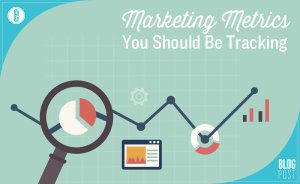
Sure, there are the common metrics that all marketers and business owners keep their eyes on: time users spend on your website, the bounce rate, how many returning visitors you get, total conversions into sales. But there are some lesser-known marketing metrics that aren’t given a lot of lip service that could push you past the mark necessary to make an enormous difference in your business.
We rounded up four examples that might not be most obvious but when you read about them, you might think “But of course!” So…onward!
Engaged Subscribers are a Key Marketing Metric
Hubspot made a drastic decision last year to reduce their subscribers, unsubscribing about half of their list–choosing to eliminate names attached to old email addresses and those who weren’t engaging. They realized they were overwhelming a large portion of their list. Really, they valued engaged subscribers over the volume of new subscribers. Two things happened as a result:
1. Traffic from their email notifications increased.
2. Their blog email notification opens, clicks, open rates, and clickthrough rates (mostly) increased.
They were pleased with the results:
“No longer are we padding our metrics with vain, inflated subscribers who ultimately harm our deliverability and email performance. Instead, we’re keeping our email list smaller, but way healthier and more effective.”
Reader Comments and Social Shares
Social sharing is an example of an effective marketing metric for several reasons. In his piece, “Content Marketing KPIs: 5 Metrics that Matter” Kevin Cain notes that “Compared to metrics like page views, average time on page, and bounce rate, some might argue that social shares, comments, and inbound links are leaps and bounds ahead when it comes to determining the perceived value of your content.
After all, a “tweet this” or a “like” can essentially be equated with the visitor vouching for a post, asserting that it has some value and that it will have value for others, as well. When another website or blogger links to your content, they’re essentially endorsing it and exposing it to a broader audience. And when someone comments on an article or blog post, it’s a direct confirmation that a visitor found your content relevant enough to engage and take action with it.”
And, according to Jeff Bullas, “Measuring your social shares will help you determine what kind of traction your content is receiving on social platforms, in addition to how well your business is taking advantage of this traffic source.
To get started, measure your overall social shares, the number of social shares each piece of content received and the number of visitors that arrived on your website from social sites. Doing so will show you what types of content to focus on in the future, as well as on which social platforms you should allocate your marketing resources.”
Okay, so those are arguably external actions where you must rely on the action (or inaction) of your readers and visitors to measure and track your marketing metrics and goals. But what about something you can actively do? This is where content marketing comes in.
Backlink Generation
We’ve shouted about longtail keywords from the rooftops before, and we’ll continue to do so. We also discuss how picking the right ones are key, because if you slap up any old keyword just to increase traffic, it will backfire, Carl. In addition, we also are huge champions of linking to other outlets and experts for expanded SEO.
Writtent agrees. Here, they make the case for linking diligently throughout your articles and blog posts:
Backlinks are one of the most crucial aspects of a search engine algorithm. The more high-quality backlinks your content attracts from authoritative websites and blogs in your industry, the higher rankings and more traffic you’ll get.
Typically, the more useful your content is, the more backlinks it will attract. That’s why you should be trying to make each piece you release a real pillar resource for readers.
Your Friendly Marketing Metrics Reminder
99 Robots advises that you keep in mind that just because you don’t see immediate correlations to revenue that your brand awareness campaigns are ineffective. For example, your campaigns may increase website authority overall and lead you to rank for more keywords and generate increased organic traffic.
So focus on these unsung marketing metrics heroes examples and see the change!
-FINAL(01-00)-White&Blue-01.svg)




